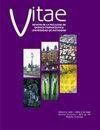In-vitro effect of the methanolic extract of Momordica charantia on hatching of eggs of Haemonchus sp.
Q3 Pharmacology, Toxicology and Pharmaceutics
引用次数: 1
Abstract
Background: Endoparasitism, particularly infections by gastrointestinal nematodes (e.g., Haemochus sp.), has been associated with economic losses within sheep production systems in tropical regions. Thus, implementing therapeutic alternatives that are environmentally sustainable is essential for parasite integral control programs. Objectives: Evaluate in-vitro the effect of Momordica charantia methanolic extract on the Haemonchus sp. eggs' hatching process. Methods: Nematode eggs were retrieved from experimentally infected sheep and exposed to 10, 20, 40, 80, and 160 mg/mL of methanolic extract of M. charantia. Hatching percentages were recorded from five replicates, and CL50 and CL90 were estimated through Probit regression analysis. Results: A significant effect on the hatching percentages were observed, from 24.2% up to 84.6% inhibition (p<0.05). The LC50 and LC90 estimated were 52.2 mg/mL (95%CI 37.87-63.22) and 201.45 mg/mL (95%CI 186.01-221.89), respectively. Utilizing a preliminary phytochemical analysis, potential antihelmintic compounds such as alkaloid, triterpenes, and anthracenic glycosides groups were identified in the methanolic extract. Conclusions: In the in-vitro test, the methanolic extract of M. charantia was effective in inhibiting the hatching of Haemonchus sp., which is important to promote other bio-guided fractionation studies of this plant on different life stages of H. contortus, this being a plant species widely adapted to the conditions of the piedmont (foothills) of Meta, Colombia.苦瓜甲醇提取物对血螨卵体外孵化的影响。
背景:在热带地区,内寄生,特别是胃肠道线虫(如血蚊)的感染与绵羊生产系统中的经济损失有关。因此,实施环境可持续的治疗方案对于寄生虫整体控制计划至关重要。目的:评价苦瓜醇提物对血螨卵孵化过程的影响。方法:从实验感染的绵羊中取出线虫卵,分别暴露于10、20、40、80和160 mg/mL的沙氏支原体甲醇提取物中。记录5个重复的孵化率,通过Probit回归分析估计CL50和CL90。结果:对孵化率有显著影响,抑制率从24.2%提高到84.6% (p<0.05)。LC50和LC90分别为52.2 mg/mL (95%CI 37.87-63.22)和201.45 mg/mL (95%CI 186.01-221.89)。利用初步的植物化学分析,在甲醇提取物中鉴定出潜在的抗蠕虫化合物,如生物碱、三萜和蒽苷基。结论:在离体实验中,沙兰甲醇提取物对血螨(Haemonchus sp.)的孵化有明显的抑制作用,这对于促进其他生物引导分离研究沙兰在不同生命阶段对哥伦比亚梅塔(Meta)山前(山麓)条件下广泛适应的沙兰植物有重要意义。
本文章由计算机程序翻译,如有差异,请以英文原文为准。
求助全文
约1分钟内获得全文
求助全文
来源期刊

Vitae
PHARMACOLOGY & PHARMACY-
CiteScore
1.20
自引率
0.00%
发文量
0
审稿时长
>12 weeks
期刊介绍:
The journal VITAE is the four-monthly official publication of the School of Pharmaceutical and Food Sciences, and its mission is the diffusion of the scientific and investigative knowledge in the various fields of pharmaceutical and food research, and their related industries. The Journal VITAE is an open-access journal that publishes original and unpublished manuscripts, which are selected by the Editorial Board and then peer-reviewed. The editorial pages express the opinion of the Faculty regarding the various topics of interest. The judgments, opinions, and points of view expressed in the published articles are the responsibility of their authors.
 求助内容:
求助内容: 应助结果提醒方式:
应助结果提醒方式:


